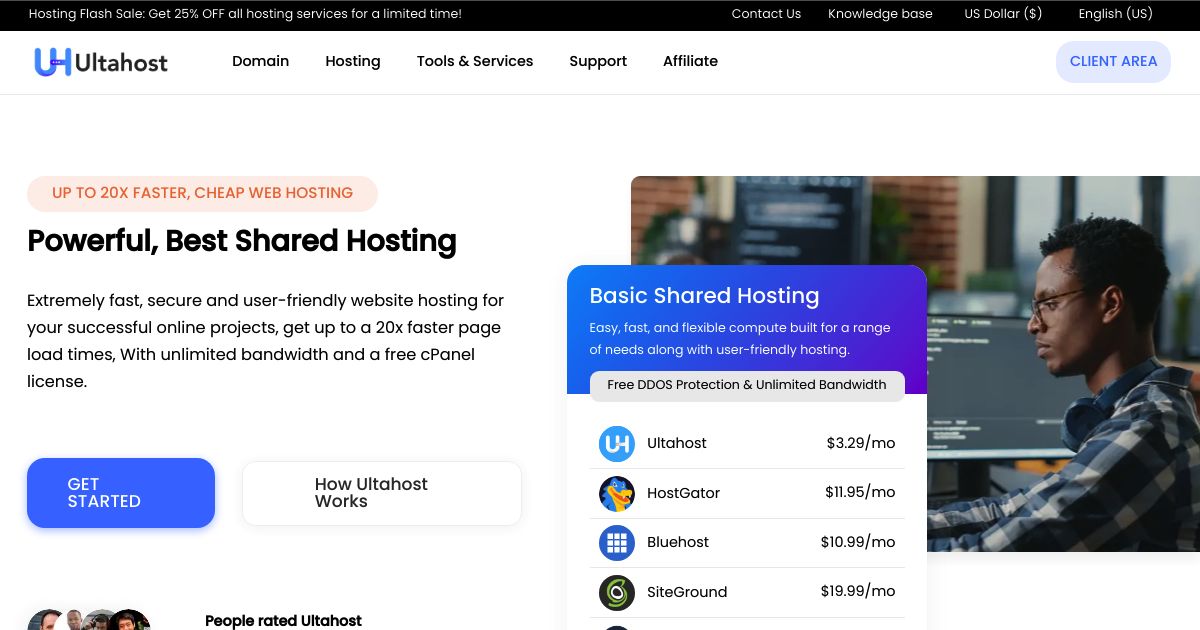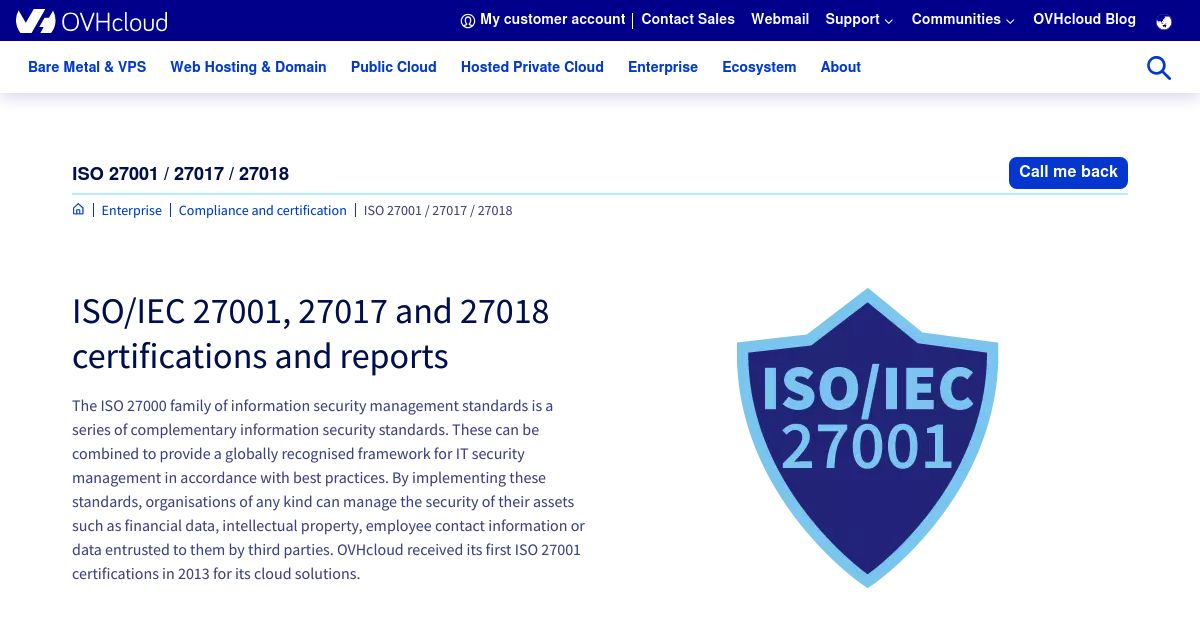GoDaddy is one of the biggest names in web hosting but as with any other service there are always viable options. This industry behemoth has been around for more than two decades now and offers a product range simply staggering in breadth.
Yet being the biggest does not always mean it is the best at everything. For those who are not able to find what you need at GoDaddy or are simply not happy with its hosting performance, there are options. Many websites today are highly specialized and can benefit more from a host that offers some outstanding products rather than just having many of them.
Hostinger

Hostinger has swiftly risen from its humble beginnings in 2004 to become a globally recognized web hosting powerhouse, known for its affordable, user-friendly services and innovative technologies like the proprietary hPanel. With a commitment to excellence and a rapidly expanding team, Hostinger continues to redefine the web hosting landscape, making it easier for users around the world to establish their online presence.
Cheapest Hosting Plans Available
Recommended for
Number of Websites Allowed
Hostinger Pros
- Affordable pricing
- Nine different data centers in four continents
- Good spread of hosting plans
- User-friendly control panel (hPanel)
- Wide range of payment options accepted
- Git environment available on shared hosting
- Additional 7% discount with coupon code “HOSTSCORE”
Hostinger Cons
- Price increase during the renewal
- Does not support Windows hosting
NameCheap

Namecheap is another long-serving company in the web hosting business and was founded way back in 2000. They are an excellent resource for not just new domain names, but you can also bid for some existing ones as well. NameCheap also offers a good range of hosting solutions including shared, VPS, dedicated, and reseller plans. While their hosting features might not be outstanding, they are certainly adequate – especially when you consider their exceptionally low pricing.
Cheapest Hosting Plans Available
Recommended for
Number of Websites Allowed
HostScore
NameCheap Pros
- Budget-friendly shared hosting plans
- Excellent domain name prices with free lifetime privacy protection
- Free site migration
- Perl, Ruby, and Python support in shared hosting plan
NameCheap Cons
- Price increase during the renewal
- Limited VPS plans
- Only US and UK-based servers
- Pay extra to choose UK-data center
TMDHosting

TMDHosting is a full-service host and offer the gamut of hosting types ranging from shared all the way to dedicated servers. Plans are reasonably priced and come with significant value-added features. The company operates from data centers in five continents including South America and Africa, which is not often seen in market.
Cheapest Hosting Plans Available
Recommended for
Number of Websites Allowed
HostScore
TMDHosting Pros
- Affordable pricing
- Choice of global data centres in six continents
- Easy-to-use centralized dashboard
- Free white glove migration
- Host unlimited websites in Business or Enterprise plans
- Outstanding customer support
- Reinforced DDoS protection for all shared hosting accounts
TMDHosting Cons
- Lowest shared plan does not support automatic backup
- Free domain has no privacy protection
- Price increase during the renewal
Ultahost

Being the new kid in town Ultahost hosting offers are tempting. That’s especially true for their cheaper plans like Shared Hosting or WordPress Hosting. The cost is meager, and the company doesn’t overly penalize those that don’t want extended contracts. There’s no harm in taking them for a spin at just $3 per month with 99.99% uptime guarantee and free website migrations.
Cheapest Hosting Plans Available
Recommended for
Number of Websites Allowed
HostScore
Ultahost Pros
- Outstanding server uptime and speed performance
- Highly competitive pricing
- Easy-to-use user dashboard
- NVMe SSD storage in all shared hosting plans
- Free malware scan & web applications firewall (WAF) in all shared hosting plans
- Choice of 5 server locations in four continents
Ultahost Cons
- Price increase during the renewal
- Limited disk space.
Hostens

Hostens hosting plans come extremely feature-packed at highly competitive signup discount rates. Though their EU-only servers does present a bit of a potential disappointment for international customers.
Cheapest Hosting Plans Available
Recommended for
Number of Websites Allowed
Hostens Pros
- Highly competitive pricing
- Support Ruby and Python in all shared hosting plans
- Daily backup included in all shared hosting plans
- Choice of 10 distributed data centers in seven countries
Hostens Cons
- Price increase during the renewal
- Limited storage in shared hosting plans
- Hosting upgrade to VPS only (lack higher hosting capacity)
ScalaHosting

ScalaHosting has a full range of products including Cloud and VPS hosting with its in-house built control panel, sPanel. The “Anytime Unconditional Money-back Guarantee” offered by the company transforms their offers into an irresistible proposition, particularly for those eager to experiment with their services without any financial risk.
Cheapest Hosting Plans Available
Recommended for
Number of Websites Allowed
HostScore
ScalaHosting Pros
- Outstanding hosting uptime and speed performance
- Affordable pricing
- Anytime unconditional Money-back Guarantee
- Automated backup with 7 restore points
- Generous offer in server resources – Even the lowest shared plan gets unmetered bandwidth and unlimited emails
- NVMe SSD storage for all shared hosting plans
- Innovative technology – SPanel, SShield, SWordPress
ScalaHosting Cons
- Price increase during the renewal
Chemicloud

A relatively new player in the web hosting scene, Chemicloud first emerged in 2016. Since then, they’ve been growing slowly but steadily. Part of that is their focus on increasing their capabilities alongside their customer base.
Cheapest Hosting Plans Available
Recommended for
Number of Websites Allowed
Chemicloud Pros
- Excellent reliability and speed
- Dev-friendly packages available
- Well-priced
- Impressive customer support
Chemicloud Cons
- Lack of other business services
- Limited knowledge base
The Problem with GoDaddy Hosting Service
GoDaddy is big and has a lot to offer, these are undeniable facts.
Yet when it comes to web hosting, simply finding a solution is only part of the journey. Where new users might want convenience, veterans to web hosting often seek to optimize their investment.
So, specifically, there are a number of reasons why not to go with GoDaddy. These include:
Suboptimal Performance
The performance of a website affects branding, reputation, and can even directly affect revenue. This means that users who have been running sites for some time are always on the lookout for host to make their sites perform faster – even if the difference is in milliseconds.
Less Focused Customer Support
Another thing to consider when it comes to GoDaddy is that big companies like this seldom give you the level of personalized service that a smaller one can. Smaller companies are often more heavily invested in each of their users – and this shows in the level of support available.
Nightmare Installing SSL
Because GoDaddy sells a huge range of products it has obviously built its structure around pushing the sale of those. In many areas this isn’t a massive problem but for some it causes users a nightmare. Take for example the case of SSLs.
All websites today need SSLs, to offer customers better security and for SEO ranking purposes. GoDaddy tries hard to sell its own SSLs and this has resulted in a system that tries to make it as hard as possible for users to install free certificates such as those from Let’s Encrypt.
Overly Commercial
We get it – web hosting is a big business that expected to reach $216.59 billion by the year 2025. Trying to sell customers more than they need is common for many companies. GoDaddy takes this to an entirely new level. I was deeply unimpressed that during the purchase process, they try to sell already included features as ‘addons that can cost more than the basic plans themselves, such as ‘website backup’.
Final Thoughts
For many people, GoDaddy can be an incredibly impressive brand because of their longevity and the large number of products available.
Simply speaking, if you’re seeking a one-stop-shop where you can find anything web hosting related, GoDaddy is likely at the top of that list.
Yet from the alternative web hosts I’ve suggested above, you might notice that having the most products doesn’t necessarily mean that a web host has paid full attention to all of them. Websites, like individual people, often have their own specific needs or characteristics.
Although GoDaddy might be an excellent choice of launch pad for a new website, if you already have a site running and are looking to boost performance even further, there are more options.
Performance in terms of speed and reliability is the cornerstone of web hosting but often, different brands place varying degrees of focus on various areas. Take for example GreenGeeks, which packages excellent performance in with a concept (eco-friendly hosting) that might be needed by some specific users.
Other areas where alternatives might be better is if they focus on user needs like eCommerce, developer tools, or, as in the case of ScalaHosting, simply offers superior all-round capabilities.


